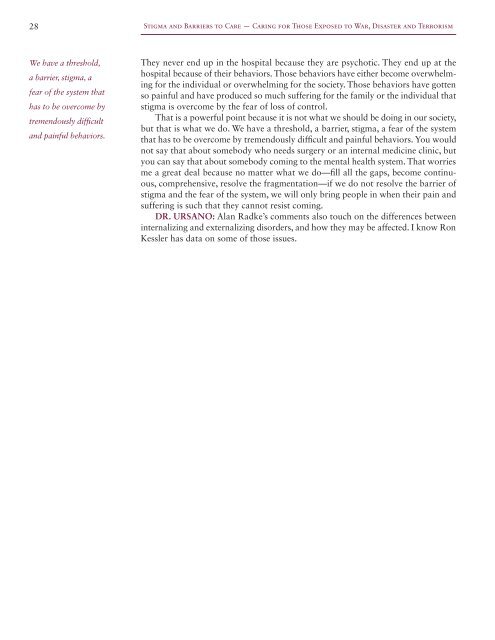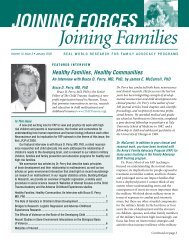stigma and barriers to care - Uniformed Services University of the ...
stigma and barriers to care - Uniformed Services University of the ...
stigma and barriers to care - Uniformed Services University of the ...
You also want an ePaper? Increase the reach of your titles
YUMPU automatically turns print PDFs into web optimized ePapers that Google loves.
28<br />
Stigma <strong>and</strong> Barriers <strong>to</strong> Care — Caring for Those Exposed <strong>to</strong> War, Disaster <strong>and</strong> Terrorism<br />
We have a threshold,<br />
a barrier, <strong>stigma</strong>, a<br />
fear <strong>of</strong> <strong>the</strong> system that<br />
has <strong>to</strong> be overcome by<br />
tremendously difficult<br />
<strong>and</strong> painful behaviors.<br />
They never end up in <strong>the</strong> hospital because <strong>the</strong>y are psychotic. They end up at <strong>the</strong><br />
hospital because <strong>of</strong> <strong>the</strong>ir behaviors. Those behaviors have ei<strong>the</strong>r become overwhelming<br />
for <strong>the</strong> individual or overwhelming for <strong>the</strong> society. Those behaviors have gotten<br />
so painful <strong>and</strong> have produced so much suffering for <strong>the</strong> family or <strong>the</strong> individual that<br />
<strong>stigma</strong> is overcome by <strong>the</strong> fear <strong>of</strong> loss <strong>of</strong> control.<br />
That is a powerful point because it is not what we should be doing in our society,<br />
but that is what we do. We have a threshold, a barrier, <strong>stigma</strong>, a fear <strong>of</strong> <strong>the</strong> system<br />
that has <strong>to</strong> be overcome by tremendously difficult <strong>and</strong> painful behaviors. You would<br />
not say that about somebody who needs surgery or an internal medicine clinic, but<br />
you can say that about somebody coming <strong>to</strong> <strong>the</strong> mental health system. That worries<br />
me a great deal because no matter what we do—fill all <strong>the</strong> gaps, become continuous,<br />
comprehensive, resolve <strong>the</strong> fragmentation—if we do not resolve <strong>the</strong> barrier <strong>of</strong><br />
<strong>stigma</strong> <strong>and</strong> <strong>the</strong> fear <strong>of</strong> <strong>the</strong> system, we will only bring people in when <strong>the</strong>ir pain <strong>and</strong><br />
suffering is such that <strong>the</strong>y cannot resist coming.<br />
DR. URSANO: Alan Radke’s comments also <strong>to</strong>uch on <strong>the</strong> differences between<br />
internalizing <strong>and</strong> externalizing disorders, <strong>and</strong> how <strong>the</strong>y may be affected. I know Ron<br />
Kessler has data on some <strong>of</strong> those issues.




